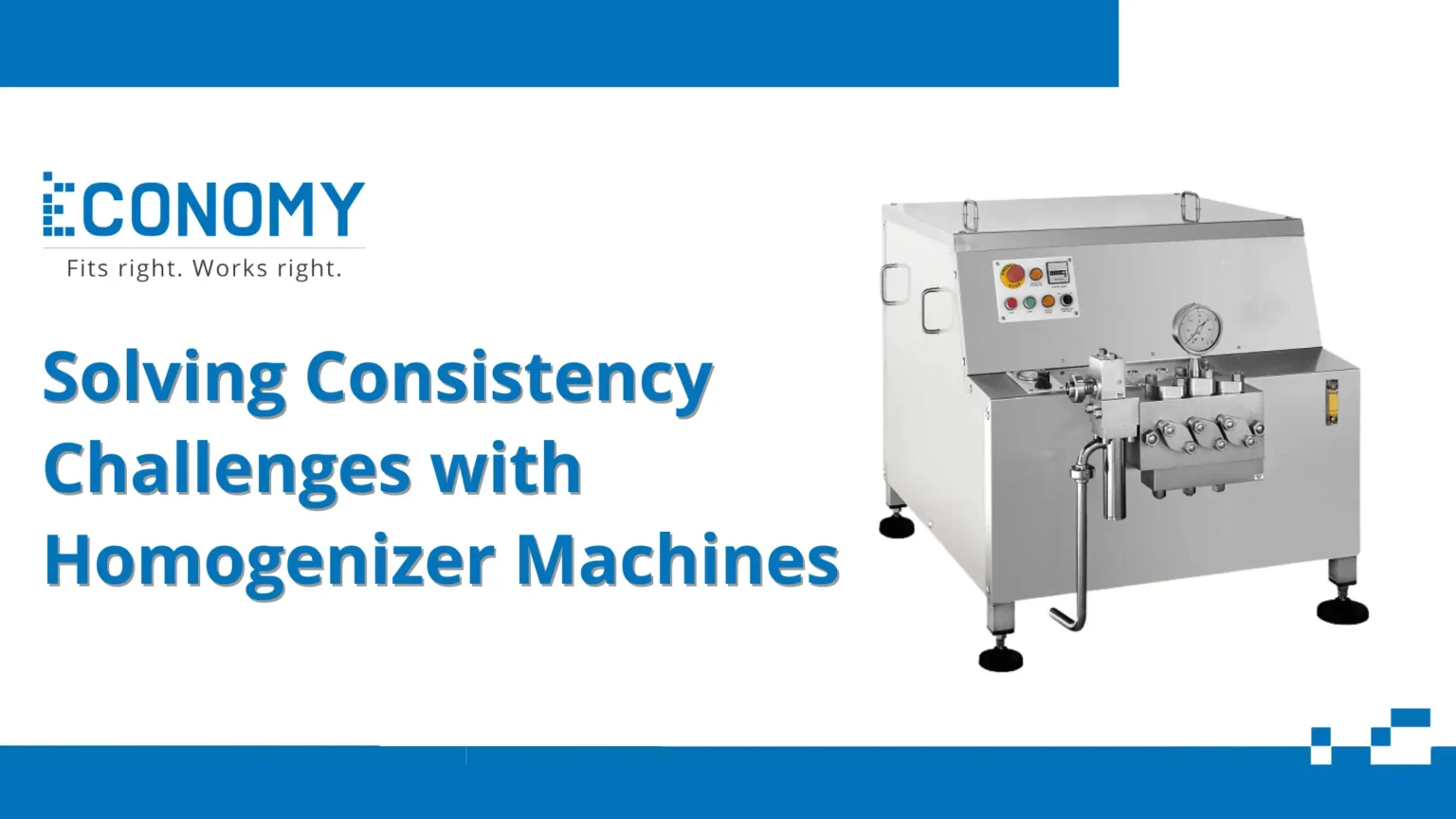In industrial applications, product consistency is a crucial factor that can significantly impact the quality, efficiency, and success of production processes. Consistency ensures that every unit or batch of a product adheres to specific quality standards. Which is vital for meeting customer expectations and regulatory requirements. Achieving uniformity in product characteristics such as texture, flavor, appearance. And chemical composition is particularly important in industries like food and beverage, pharmaceuticals, cosmetics, and chemicals.
Inconsistencies can lead to substantial economic losses due to product recalls, waste, and inefficiencies, ultimately affecting a company’s reputation and bottom line.
Homogenizer machines play a vital role in maintaining product consistency at an industrial scale. These machines work by reducing the size of particles in a product, achieving a homogeneous mixture that ensures uniform distribution of components. This process not only helps in stabilizing the product over time but also enhances its quality by improving attributes like texture, viscosity, and mouthfeel, particularly in emulsions and dispersions.
Mechanisms Of Homogenization: Achieving Uniform Particle Size And Distribution
Homogenization is a critical process in many industries that require consistent and uniform product textures, such as food and beverage, pharmaceuticals, and cosmetics. The primary aim of this process is to achieve uniform particle size and distribution. Which significantly enhances the quality and efficacy of the final product. The mechanism of homogenization involves several physical processes working in tandem to break down particles and distribute them evenly throughout the medium.
One key process is high-pressure homogenization, where a product is forced through a narrow orifice under high pressure. This sudden decrease in pressure causes turbulence and cavitation, breaking particles into smaller, more uniform sizes. Shearing forces complement this action by further reducing particle size and aiding in their even dispersion throughout the medium.
Another important aspect is the repeated cycling of the product through the homogenizer. Which ensures that particles achieve a consistently small size and uniform distribution. This repeated action helps in eliminating agglomerates and ensures that even the most stubborn particles are adequately processed. By achieving uniform particle size and distribution, homogenizer machines can significantly enhance the consistency and stability of products, leading to improved performance and extended shelf life.
Economy’s Homogenizer Machines: Technical Specifications For Consistency Solutions
In the ever-evolving landscape of industrial production, achieving product consistency is paramount. Economy’s homogenizer machines, designed with cutting-edge technology, play a critical role in ensuring uniformity and quality across various industries. These machines are engineered to address the challenges of particle size reduction and distribution, providing solutions that meet stringent consistency requirements. The technical specifications of Economy’s homogenizers reveal their sophistication and capability.
At the heart of the system, their high-pressure pumps are designed to exert pressures ranging from 100 to 30,000 psi, effectively reducing particle size to the micron and submicron levels. This capability is crucial for creating stable emulsions and suspensions, reducing variability, and improving overall product quality. The homogenizers feature robust stainless-steel construction that ensures durability and resistance to corrosion, vital for maintaining hygiene standards in industries like food processing and pharmaceuticals.
These machines are equipped with precision-engineered homogenizing valves, which control shear forces and turbulence to achieve the desired consistency efficiently.
Economy’s homogenizers also boast advanced cooling systems to manage heat generated during high-pressure operations, safeguarding sensitive components and ensuring prolonged operational life. Additionally, their modular design allows for easy integration into existing production lines, offering flexibility and scalability. Through these specifications, Economy’s homogenizer machines deliver unmatched consistency, supporting the demands of industries reliant on precise and uniform production outcomes.
Core Features And Specifications Of Homogenizer Machines
Homogenizer machines are crucial in industrial applications where product consistency is paramount. A core feature of these machines is their ability to apply intense pressure and mechanical forces to achieve uniform particle size and distribution, contributing to the overall quality of the product. Modern homogenizers are equipped with robust high-pressure pumps capable of exerting forces up to 1500 bar, ensuring thorough processing of materials.
They often include adjustable valve systems, which allow for precise control over the homogenization intensity. Adapting to diverse material viscosities and production requirements.
The design of homogenizer machines also incorporates advanced sealing technologies, which ensure durability and minimize the risk of contamination during operation. Stainless steel construction is standard, providing resistance to corrosion and easy maintenance. Additionally, many homogenizers have digital control panels or programmable logic controllers (PLCs) that offer automation features. Enhancing operational efficiency and ensuring consistent performance throughout production runs.
How Homogenizer Machines Ensure Consistency In Production
Homogenizer machines play a critical role in ensuring consistency during production processes, primarily by creating uniform mixtures through the reduction of particle sizes. Their operation revolves around the principle of applying mechanical forces to disrupt or blend components into a homogenous state. These machines use high pressure and intense shearing forces to break down particles within a fluid, emulsifying or suspending them evenly throughout the mixture.
This process not only enhances the stability of the product but also improves texture, appearance, and overall quality.
By achieving a uniform particle size and distribution, homogenizers eliminate the possibility of separation that can occur between disparate elements, thus maintaining a consistent product throughout its lifecycle. The precision of these machines allows for repeated success in producing batches with identical properties. Which is crucial in industries such as pharmaceuticals, food and beverage, cosmetics. And chemicals, where variance can lead to significant quality control issues and economic losses.
Applications In Various Industries With Consistency Requirements And Benefits Of Choosing Homogenizer Machines
In the contemporary industrial landscape, consistency in product quality is not just a desirable attribute but a critical requirement across various sectors. Homogenizer machines play a pivotal role in ensuring this consistency, offering substantial Benefits of Choosing Homogenizer Machines across numerous industries. In the food and beverage industry, homogenizers are essential for producing products like milk, sauces, and fruit juices. Where uniform texture and stability are crucial for consumer satisfaction.
By finely breaking down fat globules and other particles, these machines ensure products remain fresh and visually appealing over time.
In the pharmaceutical industry, where precision and uniformity can significantly impact efficacy. Homogenizers are used to create consistent particle sizes in creams and suspensions, ensuring proper dosage and absorption. The homogenization process enhances the bioavailability of active ingredients, which is vital for therapeutic effectiveness.
Similarly, in the cosmetics industry, homogenizers help create stable emulsions for products like lotions and ointments. Promoting a smooth application and consistent performance. This consistency is vital for brand reliability and consumer trust.




